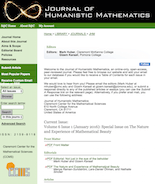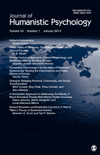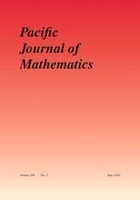
Journal of Humanistic Mathematics
metrics 2024
Unveiling the Cultural Resonance of Mathematical Ideas
Introduction
Journal of Humanistic Mathematics is a pioneering open-access journal published by the Claremont Center for Mathematical Sciences, dedicated to exploring the intersection of mathematics and the humanities. With an ISSN of 2159-8118 and operational since 2011, this journal fosters interdisciplinary dialogue among researchers, educators, and practitioners, emphasizing the role of mathematical thought in understanding human experience and culture. The journal aims to provide a platform for articles that not only advance mathematical scholarship but also illustrate the profound connections between mathematical concepts and broader humanistic themes. With its commitment to wide accessibility and a global readership, the Journal of Humanistic Mathematics stands as a vital resource for those interested in the philosophical and practical implications of mathematics in society.
Metrics 2024
 -
- 0.30
0.30 0.20
0.20 -
-Metrics History
Rank 2024
IF (Web Of Science)
JCI (Web Of Science)
Quartile History
Similar Journals

Bulletin of the Korean Mathematical Society
Fostering Global Collaboration in Mathematical StudiesThe Bulletin of the Korean Mathematical Society is a premier journal published by the Korean Mathematical Society, aimed at disseminating significant advancements in the field of mathematics. With its ISSN 1015-8634, this journal serves as a vital resource for researchers, educators, and students seeking to stay abreast of contemporary mathematical developments. Although it currently does not offer open access, its rigorous peer-review process ensures the publication of high-quality research that adheres to international standards. Based in South Korea, the journal has demonstrated its commitment to advancing mathematical knowledge since its converged years, particularly from 2006 to 2024. Achieving a Q3 quartile ranking in Mathematics (Miscellaneous) for 2023, it holds a Scopus ranking of #298/399, placing it in the 25th percentile within its category. This positions the bulletin as a relevant outlet for emerging research and scholarly contributions, fostering a collaborative environment for academics worldwide.

JOURNAL OF HUMANISTIC PSYCHOLOGY
Illuminating the Intersection of Psychology and PhilosophyThe Journal of Humanistic Psychology, published by SAGE Publications Inc, stands as a leading platform in the fields of psychology, philosophy, and sociology, catering to scholars and practitioners who seek to explore the depth of human experience through a humanistic lens. With an ISSN of 0022-1678 and E-ISSN of 1552-650X, this esteemed journal has a rich history dating back to its inception in 1961 and continues to thrive, with articles that challenge and enhance our understanding of human behavior and values. The journal is recognized in the top quartiles of its categories—Q1 in Philosophy and Sociology and Political Science, and Q2 in Social Psychology—indicating its significant impact and relevance in academia. Additionally, the journal boasts impressive rankings within major databases, including being in the 97th percentile in Arts and Humanities Philosophy and the 88th percentile in Social Sciences Sociology and Political Science. With its commitment to rigorous, qualitative research and a focus on the human condition, the Journal of Humanistic Psychology is essential reading for those dedicated to advancing knowledge and practice in humanistic approaches.

Rivista di Matematica della Universita di Parma
Illuminating the Frontiers of Mathematical ResearchRivista di Matematica della Universita di Parma is a distinguished academic journal published by UNIV STUDI PARMA that serves as a vital platform for disseminating research in the field of mathematics. Established as a key resource for scholars, this journal has been contributing to the academic landscape since its inception and continues to promote rigorous mathematical discourse. With an ISSN of 0035-6298, it is indexed within the Scopus database, holding a Q3 ranking in Mathematics (miscellaneous) as of 2023. Although it is not an open-access journal, the Rivista di Matematica provides valuable insights and findings essential for advancing the knowledge and application of mathematics, catering to a diverse audience of researchers, educators, and students. Operating from the heart of Italy, specifically from VIA UNIVERSITA 12, PARMA 43100 PR, ITALY, the journal highlights significant advancements and emerging trends in mathematical research, thereby fostering a collaborative and innovative academic environment.

Journal of Jesuit Studies
Illuminating the Jesuit Impact on History and SocietyWelcome to the Journal of Jesuit Studies, a premier scholarly outlet dedicated to advancing the understanding of Jesuit history, culture, and thought. Published by BRILL, this esteemed journal has maintained an Open Access format since 2014, allowing unrestricted access to critical research ensuring that findings can reach a wider audience. Based in the Netherlands, the journal has consistently achieved a commendable ranking of Q2 in both History and Religious Studies as of 2023, demonstrating its strong impact and relevance in these fields. With Scopus rankings placing it in the 74th percentile among peers, the Journal of Jesuit Studies serves as an essential platform for scholars, professionals, and students to explore and discuss the multifaceted legacy of the Jesuits from 2014 to 2024. Its commitment to interdisciplinary dialogue further solidifies its position as a valuable resource for those engaged with this rich historical tradition.

British Journal for the History of Mathematics
Illuminating the Journey of Mathematical KnowledgeBritish Journal for the History of Mathematics, published by Taylor & Francis Ltd, serves as a vital platform for scholars engaged in the exploration of mathematical history and its impact on the evolution of education, philosophy, and science. With an ISSN of 2637-5451 and E-ISSN of 2637-5494, this journal showcases high-quality research articles that delve into the rich narratives behind mathematical concepts, theorists, and practices from ancient to modern times. Although currently categorized in the fourth quartile across key academic domains—including Education and the History and Philosophy of Science—its commitment to fostering scholarly discourse and providing accessible insights into the historical context of mathematics makes it an important resource for researchers, professionals, and students alike. While the journal may not currently offer open access, it aims to enhance visibility and dissemination of work from 2019 to 2024 and beyond, contributing to the understanding of mathematics not merely as a discipline but as a significant cultural artifact.

Muenster Journal of Mathematics
Bridging theory and application in the world of mathematics.Muenster Journal of Mathematics, published by the Westfälische Wilhelms-Universität Münster, Mathematics Institute, serves as a prominent platform for advancing research in pure and applied mathematics. With an ISSN of 1867-5778 and an E-ISSN of 1867-5786, this journal is dedicated to fostering interdisciplinary collaboration among mathematicians, statisticians, and theoretical researchers. While currently not operating under an open access model, the journal ensures that esteemed research contributions undergo rigorous peer review, maintaining high academic standards and integrity. The journal's commitment to disseminating innovative mathematical ideas is reflected in its diverse scope, encompassing fields such as algebra, topology, analysis, and applied mathematics. As a vital resource for researchers, professionals, and students alike, Muenster Journal of Mathematics plays a crucial role in shaping the future of mathematical sciences and fostering scholarly dialogue. The journal welcomes submissions that provide novel insights and methodologies, thereby encouraging the exploration of complex mathematical concepts.

International Journal for Technology in Mathematics Education
Enhancing teaching methodologies for a digital age.International Journal for Technology in Mathematics Education (ISSN: 1744-2710, E-ISSN: 2045-2519) is a pioneering platform published by Research Information Ltd that focuses on the interplay between technology and mathematics education. Established to bridge the gap between pedagogical practices and technological advancements, this journal connects researchers, educators, and practitioners in a bid to enhance teaching methodologies and optimize learning outcomes in mathematics. Although its coverage in Scopus was discontinued after 2020, it continues to be a vital resource for those interested in the integration of technology into educational settings. With its significant emphasis on interdisciplinary approaches, the journal has garnered attention in the realms of social sciences and computer science, with Scopus rankings reflecting its niche contributions. This journal is crucial for professionals aiming to explore innovative techniques in mathematics education, making it an invaluable addition to any academic library.

Educational Studies in Mathematics
Empowering Educators with Cutting-Edge ResearchEducational Studies in Mathematics, published by Springer, is a prestigious journal dedicated to advancing the field of mathematics education. With an impressive impact factor and a distinguished Q1 ranking in both the Education and Mathematics categories as of 2023, the journal plays a vital role in disseminating high-quality research and innovative methodologies. Since its inception in 1968, it has continually provided a platform for educators, researchers, and policymakers to explore the multifaceted relationship between mathematics and education, emphasizing theoretical frameworks, practical applications, and empirical studies. Situated in the Netherlands, this journal boasts a remarkable reputation with its Scopus rankings, placing it among the top percentile in both Mathematics and Social Sciences. Although it does not currently offer open access, Educational Studies in Mathematics remains a crucial resource for those committed to enhancing mathematics education globally.

KENYON REVIEW
Connecting Perspectives, Inspiring Thought.KENYON REVIEW is a distinguished literary journal published by Kenyon College, nestled in the heart of Gambier, Ohio. Since its inception, the journal has served as a vital platform for emerging and established voices in the field, contributing significantly to the discourse in Literature and Literary Theory. With its ISSN 0163-075X and E-ISSN 2327-8307, the journal not only showcases a rich tapestry of literary criticism, poetry, and fiction but also emphasizes innovative perspectives on the evolution of literary studies. Though it has encountered fluctuations in its presence, as indicated by its current placement in Q4 quartile within its field and a Scopus rank of #1055 out of 1106, the journal retains its commitment to academic excellence. The KENYON REVIEW is essential reading for researchers, professionals, and students seeking to deepen their understanding of contemporary literary trends and theories. Its comprehensive approach ensures a diverse array of scholarly contributions, making it a pivotal resource in the arts and humanities.

PACIFIC JOURNAL OF MATHEMATICS
Pioneering Mathematical Thought for Over Seven DecadesThe PACIFIC JOURNAL OF MATHEMATICS, established in 1951 and published by Mathematical Sciences Publishers, is a premier peer-reviewed journal in the field of mathematics, renowned for its rigorous scholarship and impactful research contributions. With an HIndex that reflects its sustained academic influence, this journal has been categorized within the Q1 quartile in the field of mathematics (miscellaneous) as of 2023, showcasing its position among the top-tier mathematics journals globally. Although the journal operates under a traditional subscription model rather than an Open Access format, it remains dedicated to disseminating original research that spans various domains within mathematics. Researchers, professionals, and students alike will find the journal's breadth of topics and commitment to quality work instrumental in advancing their understanding and exploration of mathematical concepts. This esteemed journal continues to thrive as a vital resource for the mathematical community through its comprehensive collection of articles from a diverse range of mathematical disciplines, thus maintaining a significant role in shaping the future of mathematical inquiry.